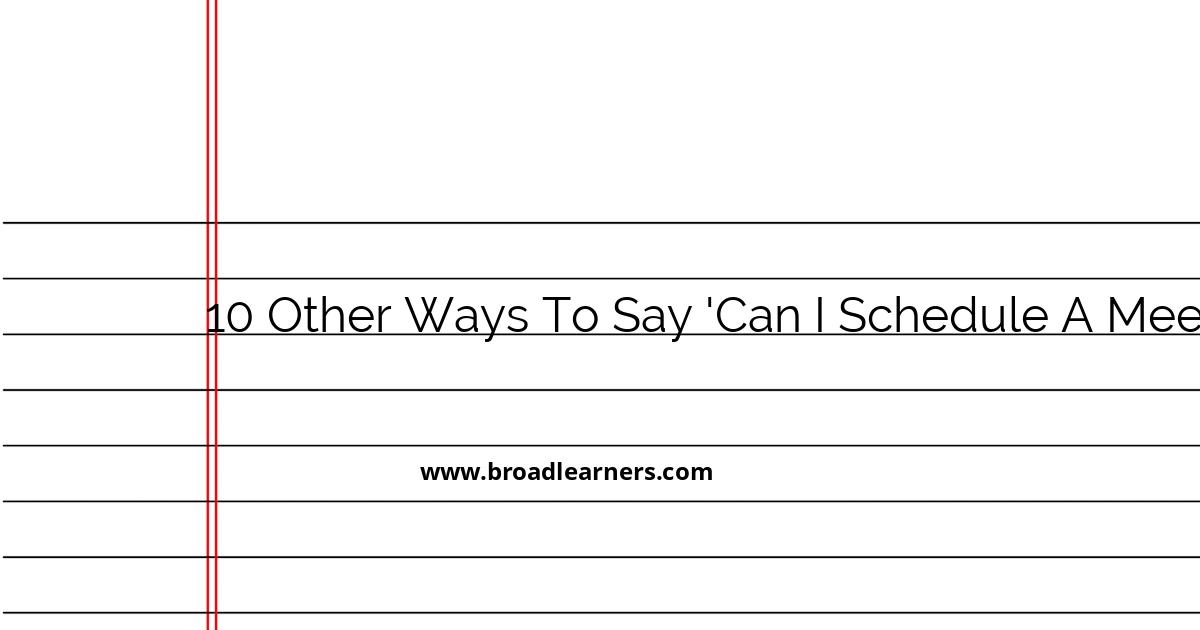In professional communication, especially in workplaces or business environments, requesting to schedule a meeting is a common task. However, routinely using the phrase 'Can I schedule a meeting?' may come across as repetitive and mundane. Fortunately, there are numerous alternative ways to express this request while maintaining professionalism. Here are ten different ways to ask for a meeting:
- Would it be possible to arrange a meeting?
- Could we set up a time to discuss?
- I'd like to schedule a meeting with you.
- Can we find a time to meet?
- Let's schedule a discussion at your convenience.
- Could we pencil in a meeting?
- Is there a good time for us to chat?
- I'd love to arrange a convenient meeting time.
- Would you be available for a conversation?
- Shall we organize a meeting on this?
Now let's delve into each alternative with detailed explanations and professional examples:
1. Would it be possible to arrange a meeting?
This phrase is a polite way to inquire if a meeting can be organized. It suggests flexibility and consideration for the other person's schedule.
Example:
Dear Dr. Lee,
Would it be possible to arrange a meeting to discuss the upcoming project milestones? Please let me know your available times.
Best regards,
Tina
2. Could we set up a time to discuss?
Using this alternative implies a desire to discuss particular topics and suggests an organized approach to setting a specific time.
Example:
Hi Mr. Thompson,
Could we set up a time to discuss your feedback on the report? I'm keen to hear your insights.
Kind regards,
John
3. I'd like to schedule a meeting with you.
This straightforward approach conveys a clear intention, making it easier for the recipient to respond with availabilities.
Example:
Hello Dr. Harris,
I'd like to schedule a meeting with you to go over the new budget proposal. Please let me know when you're free.
Sincerely,
Karen
4. Can we find a time to meet?
This expression focuses on mutual availability, inviting the recipient to suggest a time that works for both parties.
Example:
Hi Rachel,
Can we find a time to meet to discuss the marketing strategy? I'm open in the afternoons.
Thanks,
Henry
5. Let's schedule a discussion at your convenience.
By using this phrase, you emphasize respect for the recipient's schedule by inviting them to choose a convenient time.
Example:
Dear Ms. Collins,
Let's schedule a discussion at your convenience to finalize the details. Let me know when you're available.
Warm regards,
Alice
6. Could we pencil in a meeting?
This casual phrase is suitable for less formal settings and conveys flexibility, as penciling something in signifies a tentative plan.
Example:
Hey Tom,
Could we pencil in a meeting to brainstorm ideas for the event? Looking forward to your thoughts.
Best,
Sophie
7. Is there a good time for us to chat?
This phrase is inviting and shows a willingness to accommodate the other person's schedule, fostering collaboration.
Example:
Hi David,
Is there a good time for us to chat about the new implementation plan?
Looking forward,
Michelle
8. I'd love to arrange a convenient meeting time.
This expression shows enthusiasm for the meeting while prioritizing the recipient's convenience.
Example:
Dear Professor Baxter,
I'd love to arrange a convenient meeting time to discuss my thesis progress. Please let me know what works for you.
Sincerely,
Ella
9. Would you be available for a conversation?
Asking if someone is available for a conversation offers a softer approach, ideal for initiating discussions without imposing.
Example:
Hi Olivia,
Would you be available for a conversation about the partnership opportunities?
Best,
Lucas
10. Shall we organize a meeting on this?
This phrase suggests a sense of joint effort in organizing a meeting, enhancing teamwork and shared responsibility.
Example:
Dear Angela,
Shall we organize a meeting on this to ensure we're aligned? I'm available next week.
Kind regards,
Peter
These alternatives provide a variety of professional ways to request scheduling a meeting, allowing you to choose one that best fits your situation while avoiding repetition and enhancing your communication skills.

Did I miss anything? Respond below